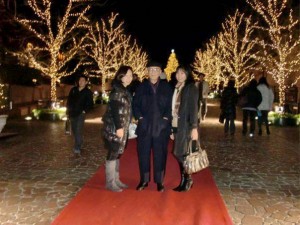Students reach out to family in Japan
On Friday March 11, a 9.0-magnitude earthquake hit Japan, setting off a tsunami with waves upwards of 12 feet. The epicenter of the earthquake was some 80 miles east of the city of Sendai. By Saturday morning, most northern areas of Japan were scenes of devastation and destruction.

Family · Christine Tai, a senior majoring in linguistics and sociology, stands with her mother and her grandfather at the Ebisu Garden Place. site for Christmas lights in Japan. - Courtesy of Christine Tai
The official death toll in Japan has exceeded 9,000 people, according to the Kyodo news agency, but domestic media has reported that over 20,000 people are dead or missing, according to Reuters. Japanese citizens are facing the loss of their homes and businesses, as well as food shortages, lack of clean water and power outages.
According to USC’s Office of International Services, there are 143 students from Japan enrolled at USC as of Fall 2010.
Ryusuke Kondo, a junior studying psychology is one of these students. Kondo explained he was not initially worried when he heard the news about the earthquake.
“I didn’t think it was such a big problem since we have so very many earthquakes in Japan,” Kondo said. “It wasn’t until I watched the news that I realized the extent of the damage and the seriousness of the situation.”
Another student from Japan, Shih Lee Tsai, first heard about the earthquake when a friend’s mother called from Japan to inform them about the situation. Tsai said it is the resulting blackouts from the failing nuclear reactors that are concerning his family the most.
“I wasn’t able to get through to them until the next day and that was only through Skype,“ Tsai said. “They tell me that the blackouts are very frequent, it’s impossible to do anything.”
Christine Tai, a senior majoring in linguistics and sociology, was able to get in touch with her family immediately after the earthquake hit Friday.
“Tokyo wasn’t hit as hard as the media portrayed it to be. The aftershocks really scare my family and food is scarce,” Tai said. “My mom told me that they’re leaving Japan for a while until things settle down. My grandfather’s going to Shanghai, and my mother to Hong Kong.”
This is Tai’s last semester at USC; she had been looking for employment at home after graduation.
“I’m looking for jobs in Japan right now, but now I’m not sure how that’s going to turn out,” Tai said.
Despite witnessing the terrible effects of the earthquake and tsunami, several students said their families have decided to remain in Japan and attempt to return to a state of normalcy. Sakurako Mori, a sophomore majoring in business administration, said her hometown and house were spared any serious damage.
“A few books fell down, but my house is intact,” Mori said. “But there are several power outages. My mom told me that she has to start cooking dinner earlier, before the power goes out. They’re slightly inconvenienced, but other than that, they’re fine.”
All international students from Japan received an email from OIS the day the earthquake hit, expressing concern about the disaster.
“We are available to talk to Japanese students who may need help with any matter related to this crisis, and there are numerous other campus resources available, including Student Counseling Services, and Student Support and Advocacy,” Tony Tambascia, executive director of the OIS, wrote in an email.
For more coverage on the devastation in Japan, click here.
